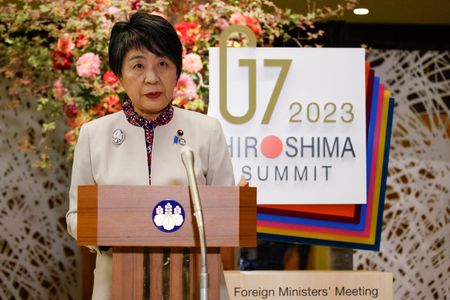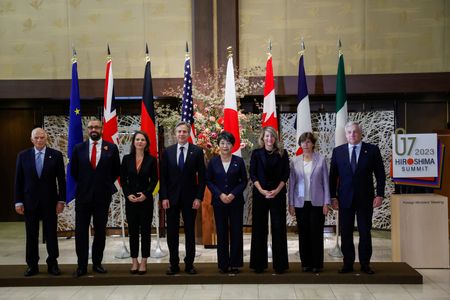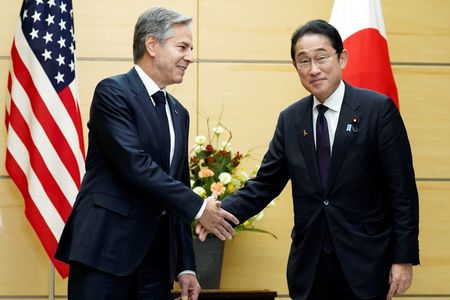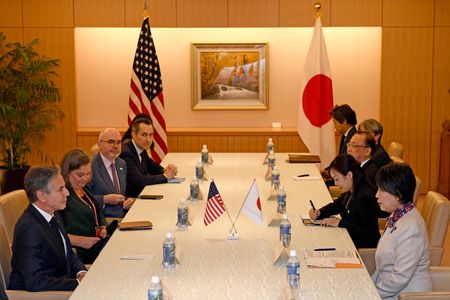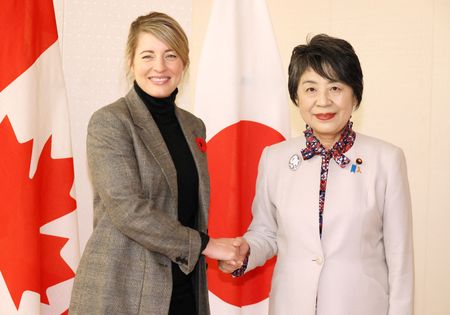By Sakura Murakami and John Geddie
TOKYO (Reuters) – G7 support for Ukraine in its war with Russia will not be affected by the intensifying Middle East conflict, Japan said on Tuesday as the group’s foreign ministers prepared to hold virtual talks with Kyiv during a meeting in Tokyo.
The Group of Seven (G7) wealthy nations – Britain, Canada, France, Germany, Italy, Japan and the United States – as well as the European Union, meet in Tokyo on Nov. 7-8 to discuss issues including Russia’s war in Ukraine and the Israel-Gaza crisis.
“Our commitment to continue strict sanctions against Russia and strong support for Ukraine has not wavered at all, even as the situation in the Middle East intensifies,” Japan’s foreign minister Yoko Kamikawa told a press conference.
At a meeting with Kamikawa later on Tuesday, U.S. Secretary of State Antony Blinken emphasised the group’s “enduring support” for Ukraine as a key item on the agenda for the talks, but also said it was an important moment to come together on the Israel-Hamas war.
The G7 is due to hold an online meeting with Ukraine’s Foreign Minister Dmytro Kuleba on Wednesday.
G7 countries recognise that Russia is settling into its war in Ukraine for the longer term and this requires enduring military and economic support for Kyiv, a senior U.S. official said after the bloc’s foreign ministers met in September.
The group has been at the forefront of sanctions on Russia since Moscow invaded Ukraine in February 2022, with Ukrainian President Volodymyr Zelenskiy making a surprise appearance at the G7 leaders summit in Hiroshima in May.
In the latest move aimed at turning the economic screws on Russia, the group is weighing up proposals to impose sanctions on Russian diamonds.
Japan also said on Tuesday that it would take an unavoidable hit from U.S. sanctions on the Arctic LNG 2 project in Russia, in which Japan companies Mitsui & Co and JOGMEC hold a combined 10% stake.
ISRAEL-GAZA RESPONSE
Finding its voice on Ukraine appears to have proved easier for the G7 than tackling the spiralling Israel-Gaza crisis which has claimed thousands of lives and threatens to spill into a regional conflict.
Since the war erupted, the G7 has issued just one joint statement on the conflict, amounting to a few sentences. Other group members have issued separate statements.
In Tokyo, the G7 plans to convey the need for a pause in fighting and allowing humanitarian access to Gaza, which has been bombarded by Israel in retaliation for an attack by Hamas militants on southern Israel on Oct 7 that killed 1,400 people, Kamikawa said.
Health officials in Gaza say more than 10,000 Palestinians, mostly women and children, have been killed so far by the Israeli bombing.
Also on Tuesday, Kamikawa, Japanese Defence Minister Minoru Kihara, and their British counterparts attended a meeting where they reiterated that the two-state solution was the only viable path to just and lasting peace in the region.
A joint statement following those talks also condemned what it described as destabilising activities in the region by Iran and called on the oil-rich nation to play a more constructive role to de-escalate tensions.
G7 chair Japan has taken a cautious approach to the crisis, resisting pressure to fall in line with the pro-Israel stance of its closest ally, the United States, officials and analysts say.
But at the meeting with Blinken, Kamikawa said there was “solid unity” between the countries on the issue.
G7 divisions have also been evident at the United Nations, with France voting in favour of a resolution calling for a humanitarian truce in the conflict on Oct 26, the U.S. opposing it and the group’s other members abstaining.
G7 foreign ministers are preparing “some sort of statement” to be issued following the Tokyo talks, Kamikawa said declining to comment on its contents.
(Reporting by Sakura Murakami, Tim Kelly and John Geddie; Editing by Tom Hogue and Raju Gopalakrishnan)

